[A PHONE RINGS]
VOICE OF SOPHOMORE NIDHISHA PEJATHAYA: I feel like stress itself, it drags me behind.
VOICE OF JUNIOR ANGIE REN: I would say school does cause a lot of stress in my life, especially because it’s junior year and I have to worry about and balance many things in my life.
VOICE OF JUNIOR KATIE WALLACE: I’ve always struggled a lot with anxiety and depression, and, I mean, stress makes that exponentially worse.
VOICE OF JUNIOR LIA EMRY: Sometimes at night when I was younger, I literally could not go to sleep because I was always thinking about school and just wanting to be the best that I could be.
PEJATHAYA: I feel like while in some cases, it can help me get work done, I waste just as much time on school than I do just stressing about it.
[MUSIC PLAYS]
VOICE OF SOPHOMORE SAMIR SHAIK: Hey West. I’m Samir Shaik.
VOICE OF SOPHOMORE GIANNA LIONELLI: And I’m Gianna Lionelli.
SHAIK: And this is…
LIONELLI: “Asking for a friend,” the podcast where we talk about topics that aren’t talked about enough and what it means to be a high school student.
[MUSIC ENDS]
SHAIK: So, this is our very first episode for the Pathfinder.
LIONELLI: Yeah, this is, I mean this is so cool, such a great opportunity, and we’re so thankful for the opportunity to do this, I guess.
SHAIK: So, a little bit about me and Gianna — we’re both sophomores. What’s your course load like?
LIONELLI: I mean it’s not like anything out of the ordinary, it’s pretty much the same. My core classes, obviously all of them. I’m not in any honors, and my elective classes: journalism, obviously, and choir and German. So definitely some struggles in some of those classes, but other than that, everything is going really well. What about you?
SHAIK: Well, technically I’m in all honors, but my math class is not honors. I’m in Algebra 2/Trig but normal Algebra 2/Trig. All of my electives are year-round, just like you, so I have journalism, French and…something that I am forgetting right now that I need to remember.
LIONELLI: AP Music Theory.
SHAIK: AP Music Theory. How’d you know that but not me? But yeah, there’s definitely been some struggle. I mean, it’s definitely been difficult in some capacity, but I feel like overall, I’ve been doing pretty well.
LIONELLI: This semester was so hard for me.
SHAIK: First semester?
LIONELLI: Yeah, first semester. I had a lot of scary things happen, it was my grades.
SHAIK: A lot of stress?
LIONELLI: Lots of stress.
[MUSIC PLAYS]
SHAIK: In this episode, we’re going to talk about the different kinds of stress that students face, how to cope with stress and then also how to help out someone who is stressed.
LIONELLI: I think before we talk about bad stress, we should probably talk about good stress — first day of school.
[MUSIC ENDS]
SHAIK: The night before the first day of school when you’re going to bed and you have that nervous but excited feeling.
LIONELLI: Yeah, totally.
SHAIK: That’s that good stress. That’s the stress that will ultimately help you — push you to be better, push you to make friends, push you to be more social, push you to do good. That’s good stress.
LIONELLI: I’m so appreciative of all the counselors we have because luckily at the beginning of freshman year and sophomore year, we got a little presentation from them telling us about good stress and bad stress and how to manage it.
SHAIK: People forget that good stress exists. Stress, in some capacity, is good for you. Of course, when people think of stress, a lot of the time they think of bad stress or distress.
LIONELLI: Everything is just constantly changing in high school. It’s just hard to manage and then on top of that, you’re trying to do your schoolwork. I mean, everyone’s going through something.
SHAIK: So we ran a poll on the Pathfinder Instagram which basically asked two questions. The first one was a yes or no, “Does school cause you an excess amount of stress?” And the other one was a little thing that said “Which core class causes you the most stress?” So like math, English, science, or history. And out of the 110 people that voted, 102 of them said that school causes them a lot of stress and eight of them said that it doesn’t. I want to talk to those eight people.
LIONELLI: I’m sure what’s causing them the most stress right now is probably not school, maybe there’s something more pressing.
SHAIK: Yeah, I’m sure they’re still stress that they’re going through in some capacity, but also I feel like that stress, like you said, that is not school related.
LIONELLI: Right.
SHAIK: And we’re looking through the responses to the core class question right now. There’s a lot of math and science and also quite a bit of history, as well. Less English, which is a little bit interesting to me because my English class is a lot of work and probably causes me quite a bit of stress as well. I know that I have a bad habit of burying my feelings and my stress down deep and just kind of masking it. And I know that’s not a good thing; I know that I should be talking about these negative feelings because I know if I ignore them, they’re just going to get worse. My internal monologue whenever I do that, I’m just like, “I don’t wanna bring down the morale of the group.” I feel like I would be bringing the mood down. I don’t want to be a buzzkill, basically, which I know is not the right mentality, and I know that I should be talking to people about it, and I’m working on that. We’re all works in progress. What stress do we face? Stress from, of course, obvious reasons like stress from grades, from homework, from teachers.
LIONELLI: Pressure from parents.
SHAIK: Pressure from parents to do good, to excel. Pressure from yourself, if you hold yourself to really high standards. If you attribute your well-being to your academic success, that’s when problems will start to arise.
LIONELLI: Yeah.
SHAIK: I have this thing where I wish I could change the past. I’m like, “Why did I do that?” I stress out about decisions that I made in the past, and I’m like, “Why did I do that, why did I say that?”
LIONELLI: Yes yes yes, me too.
SHAIK: You can’t change that. It might’ve been the wrong decision to make in the moment, but you can’t change it.
LIONELLI: It happened, yeah. Okay so, I do not plan, I am not a planner, I’m a very spontaneous person.
SHAIK: That’s true.
LIONELLI: So when something happens, words come out of my mouth, and I don’t think about them. So then, I’ll look back and I’ll be like, “Oh my gosh, I should have thought about this more. I should have prepared.” I just don’t prepare for anything ever. I just don’t do that. I need to fix that.
SHAIK: Procrastination and just the work ethic thing.
LIONELLI: Yeah.
SHAIK: When I am super stressed, my number one thing that happens to me is I stay up super late at night. I’m tired, but I don’t sleep because I feel like at night is when all the pressures are off me, and I’m just alone with myself. I feel like that’s a time when no one is really judging me, their eyes aren’t on me and there’s no pressure on me. I stay up because of that, and I don’t know if you do the same thing.
LIONELLI: Well, sometimes I’m actually trying to get homework done. But I also stay up because, throughout the day, I feel like I don’t have any “me time.” I feel like the whole day is [spent] doing something for someone else, doing my homework, whatever I’m doing, dance, whatever’s going on. And at the end of the day, at 12:30 a.m., this is just my time to scroll.
SHAIK: Time to myself to just relax and be on my phone — I know it’s bad. It’s a really stressful time just in general. What’s happening in the world today, presently — it’s stressful, and it’s a lot. And it’s important to have an outlet.
LIONELLI: Yeah.
SHAIK: I’m lucky to have such a great friend group, and I have parents that I can always talk to.
LIONELLI: But that’s also, I think, why it’s important, not only to have people to talk to as your outlet, but it’s important to have an activity that you love to do that can relieve the stress, take your mind off it for a little bit.
SHAIK: Yeah. Personally, I play the piano, so I love to listen to music and play music, write music, all that kind of stuff. Exercising — I like to go for a run, or I play tennis, so doing that. Anything that gets my body moving. Stress always makes me feel really tired. Do you have that too, where you’re really stressed out and you get home from school and you’re super tired?
LIONELLI: Yeah, definitely.
SHAIK: So exercise kind of breaks it up and gets me moving.
LIONELLI: Yeah. For me, I dance, so, of course, I love to dance, the same thing with Samir, moving my body. I don’t play tennis, so I don’t do that. Sorry, Samir.
[LAUGHTER]
LIONELLI: I used to play tennis when I was really little, but I was super bad at it.
SHAIK: It’s fine, I guess.
LIONELLI: And I also really enjoy singing. Obviously, listening to music, I think a lot of people like to do that. I like taking walks, always getting a good cry in. I love crying.
[LAUGHTER]
LIONELLI: Sometimes it really does make me feel better, yeah.
SHAIK: Taking showers. I will take a shower when I’m bored.
[LAUGHTER]
LIONELLI: Where do you have the time? Like, what?
LIONELLI: I remember in Personal Finance, we took those quizzes, and we had to figure out what our future selves are, what we want to do for a career. I got kind of weird ones, they did not correspond with each other. I got teacher/educator as my first one, [and] I got event planner as my second one. There was a third one, but my fourth one was like agricultural engineer or something like that.
SHAIK: Do those choices align with what you think you’re interested in right now at least?
LIONELLI: I am thinking about being a teacher for sure, an event planner sounds fun but realistically, does not pay the bills and agricultural engineer, gotta be honest, does not interest me at all.
[LAUGHTER]
SHAIK: I forgot what I got for those, but I know that the career choices that were suggested to me, I agreed with most of them, I remember that.
LIONELLI: But the weird thing is, whenever I was growing up or whatever, you know, people were like “I wanna be an astronaut, I wanna be a doctor, I wanna be a teacher” or whatever. I never really thought about being a teacher that much, like I did when I was little, maybe for a little bit, but I mean now it’s seriously something I’m considering.
SHAIK: I don’t really exactly have an idea for what I want to become in the future.
LIONELLI: Right.
SHAIK: I don’t think any…actually that’s not true, because I know some people that have a very rigid structure.
LIONELLI: Right, yeah.
SHAIK: I think between us and I think our whole friend group, I don’t think that we have a very solid idea, which is okay. It’s not bad. You can’t ask a 16-year-old to decide what they want to be for the rest of their lives — that’s a really big ask for a high schooler. Even as an 18-year-old, even when you’re a senior. When you’re 18, to decide what you want to do for the rest of your life? I never agreed with how big of an ask that was, and I think that a lot of students are taking that so internally, and they’re internalizing that struggle so much that they’re stressing out so much about their future. They lose sight of the fact that life is fluid, and this is gonna sound corny, but you’ve got to go with the flow.
LIONELLI: There’s no reason to stress about the future right this second.
SHAIK: Yeah. Enjoy the present. Enjoy high school.
LIONELLI: Take it step by step. So, I have two older siblings and they’re in college right now. My oldest brother, he was a freshman in college and my other brother was a sophomore at Parkway West High School. Well, first of all, their paths definitely were not straight, especially with COVID-19. Everything was very weird and [we were] navigating so many new and different things. When COVID-19 happened, and we were in seventh grade, at the time, my brother was not going to the university he’s at now. He just picked this path, and now he’s figuring out that he wants to do other things, so he’s applying for different master’s programs, all this kind of different stuff. I think he’s just realizing “yeah, what I’m majoring in is really great” and my brother’s majoring in political science, but he’s also realizing “but there’s so much more I can do and so much more I’m interested in and I think that will happen to a lot of people. They’ll realize that this is great and I do love this thing, but there’s so much more that I can learn and that I do enjoy learning and will be useful in the future.
SHAIK: I have a much older brother. I was very young when he was in high school, I don’t remember much, but I do remember that he always had a plan. He was a very math and science kind of guy, he loved those subjects; he excelled at those subjects.
LIONELLI: That’s very different from my siblings.
SHAIK: Yeah, very different from me, too. I am not like that. He became an engineer, and he always knew that he wanted to go into that field. I think that the biggest stress that he had with his future is probably deciding which college to go to and just seeing through with that. But compared to me, he knew what he enjoyed and what he wanted to do.
LIONELLI: There is just no direct thing. Stuff will always come, and obstacles will always be in the way, but you’ll find your path. Everyone’s path is so, so different. Even sports, people who are planning on doing collegiate-level sports and playing in college, stuff like that. There’s just a lot of pressure from coaches, parents and yourself, of course.
SHAIK: I mean, do you think that you hold yourself to really high standards? Not just academically, but also in sports or outside of school, do you hold yourself to a high standard?
LIONELLI: Yeah and no. I think when it comes to certain things, I expect myself to do really well, like I expect to be so good at something. I expect to do so well on my English essay, or whatever. But also, sometimes I accept that I’m bad at something. Hello, me with math.
[LAUGHTER]
LIONELLI: My mom told me this one day. I was just not having it with school. It was just a really bad day and I was talking to her and my mom was like, “Do you really think in 25 years from now, you’re going to be looking back and being like, ‘man, I wish I didn’t take English 2, for example, in sophomore year of high school.’ Do you really think that’s going to matter?”
SHAIK: High school is not the most important thing that’s going to happen in your life.
LIONELLI: The goal of high school is to become a well-rounded person. Obviously, attaining knowledge: knowing how to do math and science and English and history, having a general knowledge of that is important, but of course, having a good character — that’s what high school is for. That is what school is for, to be a good person. So, of course, math, science, history, English, those are all important subjects to learn in school and inside the classroom. But how you act in the classroom is just as important: what you do, having a good character. That’ll help you in your next steps of life.
SHAIK: Also, we didn’t talk about this yet, but the stress to conform, like societal pressure.
LIONELLI: I was going to say, do you personally experience that?
SHAIK: I think that I experience it indirectly. I think that when I go to Instagram, and I’m scrolling through and I see all these people, they look and act and talk a certain way, and they get a lot of love and popularity and likes. Even in our school and just completely random strangers. There’s this feeling of, not jealousy, but…
LIONELLI: You’re different from them, and you need to be them?
SHAIK: Yeah. It distinguishes me as separate.
LIONELLI: I agree. I think mine’s more direct. Yeah, I do feel pressure to conform all the time. I mean, who doesn’t?
SHAIK: Right.
LIONELLI: This is so random, but in sixth grade, we were talking about this — the clothes you wear define how cool you are.
SHAIK: Totally.
LIONELLI: I mean, that’s one small example.
SHAIK: When you take a sec to actually look at the people who go to the school: the way they talk, act, look and dress. Their mannerisms, everything. Everyone’s different in their own way, so it’s important to keep your uniqueness. If we lived in a society where everyone is the exact same — we look, act, talk, dress and walk the exact same — it would be boring.
LIONELLI: It would be so boring. Trying to conform and be something that’s not yourself causes so much stress. Pretending to be something that you’re not, it’s so draining at the end of the day.
SHAIK: Yes, totally.
LIONELLI: If you’re having to hang around with these people who aren’t really like you and these aren’t the people who you need to spend your time with, is it worth it? Is it worth it, pretending to be something that you’re not to be considered “cool?”
SHAIK: Are whatever benefits you might get worth losing your sense of self and your individuality, almost? If you’re always trying to look like, talk like and act like these people you want to be, and you lose yourself along the way, is that worth it? And if the people you surround yourself with, if you feel like you have to put on a face or act differently around them in order to win their admiration or their respect, think “Is that worth it?”
LIONELLI: Think again.
SHAIK: Yeah, is it worth it to surround yourself with these “friends” who you have to act like a completely different person around?
LIONELLI: Right.
SHAIK: There’s no need to feel overly stressed right now.
LIONELLI: I was going to say, that’s the reason why it’s really important to have good methods, like ways to cope when you’re feeling stressed. It’s good to recognize when something is too much or when enough is enough. Know your limits.
SHAIK: Yeah. One way that I like to cope with stress is physical activity. For example: exercise or going on a long walk or just focusing on your physical self because a good physical self is related to a good mental health because they’re all connected.
LIONELLI: Yeah. Also, another way to help yourself when there’s something that’s just pressing on your mind that you’re constantly thinking of is distracting yourself from that thing. You could do anything creative — coloring, listening to music, reading a book — or just anything that you’re passionate about. I’m passionate about dance, so I’d probably dance if I felt like it. Stuff like that.
SHAIK: Yeah. And also, everyone deserves someone that they can talk.
LIONELLI: An outlet.
SHAIK: Yeah. An adult, a friend, a teacher, anyone that you trust with your feelings, that you trust will not invalidate your. They will make you feel seen and make you feel heard. So, being able to have that outlet and being able to talk to them is so useful whenever you’re stressed out, because when you hold all those feelings inside, they’re just going to keep building and building and building and building so you need an outlet to kind of relieve that and to kind of talk about your feelings with them so that way you can kind of air it all out.
LIONELLI: I mean, I think even when you’re not stressed it’s just really important to just have someone in general.
SHAIK: Yeah. Sometimes when I’m really stressed out, I feel like everything is happening at once, when in reality there’s a really clear root of stress. And so kind of identifying that and realizing what is stressing you out and isolating it can help you relieve it. Dealing with that on its own can stop that domino effect from happening where it feels like everything is going out of control.
LIONELLI: Yeah, I definitely agree. Another one, I would say this one affects me the most probably I’d say is just putting your phone down.
LIONELLI: Social media is becoming very apparent and prevalent in teens’ lives nowadays. And it’s really really becoming detrimental to our mental health. And I notice it specifically this year of high school. It has definitely affected me a lot and I just think it’s really important to put it down when it’s necessary. To just realize that it’s just become too much, this is the reason why you’re stressed and do other activities that will make you feel better.
SHAIK: Yeah. So also for homework. When there’s a ton of homework or when there’s a ton of work to be done, do you get that thing when you have so much stuff to do that you just don’t know where to start and you don’t do it?
LIONELLI: Yeah, we’ve talked about this several times before, yes, I do.
SHAIK: And then suddenly, it’s 11 p.m. and nothing has been done and there’s a whole load of homework. Because I freeze up, I’m like “oh, I have math and science and this and that.”
LIONELLI: This is really embarrassing, but I start my homework at nine o’clock, every night.
SHAIK: Me too. Because I have a lot of it and I’m like “I don’t know where to start, it’s just a lot.”
LIONELLI: Especially during sports season. Samir’s playing a sport right now, my sport just finished, so I do fall and winter. But during that time, I literally would start my homework at ten o’clock.
SHAIK: Yeah, it’s hard because you have practices and you have…well she had performances because she did dance, but we have games and it just takes a while to get home and get settled.
LIONELLI: You mean matches. You have matches.
SHAIK: We call them matches in tennis.
[LAUGHTER]
SHAIK: I was saying games for the…
LIONELLI: For the viewers.
SHAIK: For the listeners, but yeah. So by the time you get home and you…I shower when I get home and I eat and just after all that it just ends up being really late and then I have to finish all my homework. And it’s not a fun experience, let me tell you.
[LAUGHTER]
SHAIK: So, making a plan. You probably have a schedule for when you’re performing and I have a schedule for my matches, so knowing “Okay, I’m away at Parkway North for today. Assuming I’ll come home at 6:30, so I’m going to do this, this and this first then have a little break — eat some food and take a shower — and then I’ll start my homework.” And then, I always do the hardest homework assignment first, or the class with the most homework first. Because I feel like when it’s late at night and I’m really tired and my mind isn’t working as well, having to do a really difficult assignment is just not fun. I would rather do an easier assignment when I’m tired because it’s easier for me to process.
LIONELLI: I have a perfect example. So, I had a really important science assignment that I had to get done last night because all work was due by the day of the test and my test was the next day. And then I had a German test that I needed to study for and a missing German assignment that I needed to turn in because it was well overdue and my grade dropped a lot. And I also had this overdue English assignment that I really needed to do because my grade had dropped a lot. It was hard for me to know which one was the most important, but I was like “Okay, if I don’t get my science turned in, I can’t…like my grade won’t be good, because it’s all due by the day of the test.” So I did my science first and studied for that. Then, I did my German assignment and studied a little bit for German. And then, if I had any time, which I started my homework late, which I’m not proud of. I didn’t really have much time to do English, so I did the best I could, doing as much as I could and then I just went to bed. So I wasn’t able to get all of the work done that I wanted to, but I did make a plan last night, which is very rare for me.
[LAUGHTER]
SHAIK: Yeah. For my history class we have reading quizzes basically every single class, it’s over about ten pages of the textbook.
LIONELLI: Sorry, which class?
SHAIK: For history.
LIONELLI: Okay.
SHAIK: So I usually start with that because I know that…
LIONELLI: It takes a long time.
SHAIK: It takes a while to read it and take notes on it, and also it’s just that sometimes it’s cryptic, not cryptic but a little bit difficult to understand. And then I’ll do the other assignments. And everyone has a subject that they’re the strongest at. A person who is the strongest at math might start with English, and a person who’s the strongest at English might start with math. Just prioritize and know what homework you need to do first. And also, I saw this one video somewhere, I forget where, but it was like when you’re really stressed out about a lot of work, not just homework but in life, in general, when there’s a lot of work to be done, do the smallest possible thing that will progress you to finishing the work. So, for example, if I’m laying in bed and I have a ton of homework to do, what’s the smallest possible thing that I can do to finish that homework? Well, get out of bed. Or, you know, stand up. Or you could go even smaller — sit up in the bed or take the blanket off of you. If you divide it up into those really small steps — walk to the desk, sit down, open the computer, or get out the binder or whatever — if you divide it up into those really small steps it makes you feel like you’re doing a lot less work than you actually are, and it kind of motivates you to finish that work faster. Because you divide it up into little itty-bitty pieces of work that you do. So that’s the way that I do it, it might not work for everyone but I think it works great for me.
LIONELLI: As you were talking about that, it made me think of something. So, I’m also not proud of this—
[LAUGHTER]
LIONELLI: —but I do my homework in my bed, which is not good because I shouldn’t do that. But I was going to ask you, do you do your homework on your desk?
SHAIK: I think it’s really important to have a designated space for doing your homework.
LIONELLI: Because mine is my bed.
[LAUGHTER]
SHAIK: It’s also a mental thing because bed equals sleep in my mind, so if I try to do homework on my bed—
LIONELLI: —eventually I’ll fall asleep, and that has happened to me before.
[LAUGHTER]
LIONELLI: Yeah, so I was going to say, I think it’s important…it’s important for me too, because I don’t have it, to literally have a table, find a table.
SHAIK: Have a space for homework. It doesn’t matter how large it is, it can be as large or as small as you need it to be.
LIONELLI: Yeah.
SHAIK: But if you say “This area of my room is for homework, so I’m only going to do homework and work in this corner of the room, and then the bed is where I sleep.” That mentally divides it up and allows you to kind of work more efficiently, almost, because you’re in your designated working space. There is this YouTube video by this channel, his name is CGP Grey. He’s a great YouTuber. He made a video at the very beginning of quarantine because we were all locked in our homes. He used the analogy of a spaceship. Imagine you’re in a spaceship, and you have such a small amount of space, how do you be productive and maintain your health? And the trick is to divide up the space into different sections, basically. So like a space for exercise, a space for sleep, a space for recreation, a space for creativity, a space for lounging/entertainment, all that stuff. And respect the boundaries of that space. So you don’t sleep where you’re supposed to exercise, I mean, you wouldn’t sleep where you’re supposed to exercise, anyways, but you know what I mean.
LIONELLI: So, make sure you sleep on a treadmill.
[LAUGHTER]
LIONELLI: I’m kidding, I’m kidding, don’t do that, don’t do that.
SHAIK: I’m going to link that video in the episode description. It’s more related to quarantine but it works for this too, and having a space designated to specifically doing work, not just homework, but just work in general and productivity in general, allows you to kind of have that mental thing where it’s like “okay I’m in my workspace now, so I’m going to do work.” So, that’s just something that I do. And know that, in the end, you’re going to be okay.
[MUSIC PLAYS]
LIONELLI: Thank you, guys, so much for listening to this episode, it was our very first one, and we’re really thankful for all our new listeners.
SHAIK: Yeah, and we’re going to, of course, be making more in the future.
LIONELLI: So, stay tuned.
SHAIK: Thank you, guys, so much for listening and we’ll see you guys next time. Bye.
[MUSIC ENDS]

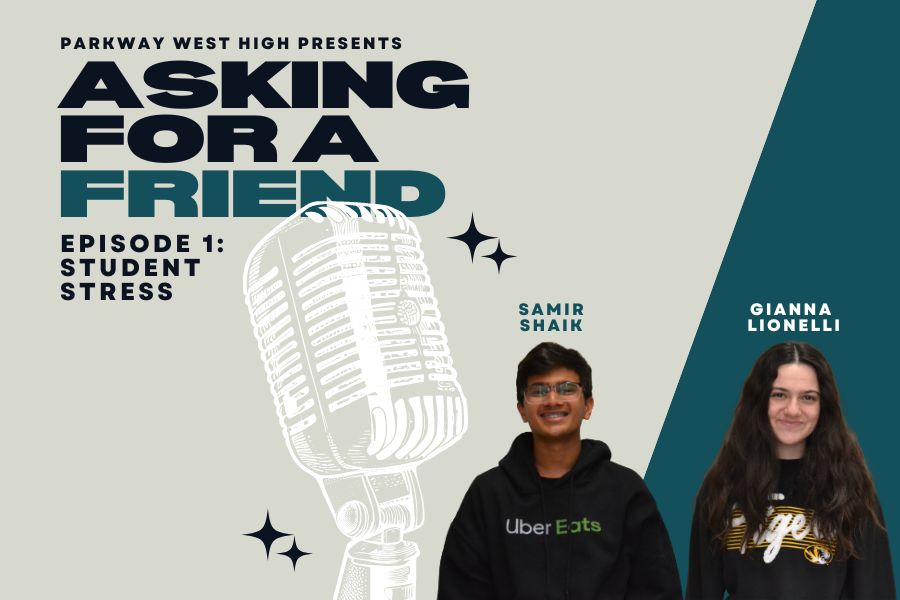


![Standing in front of the camera and next to Fox 2 News' Ty Hawkins, senior and varsity football player JaMont Brooks represents the varsity football team. As captain and outside linebacker, Brooks was one of four students selected to be interviewed live for the broadcast. “Overall, it was just a crazy experience being on the news. Even when I get older, I’ll tell my kids or grandkids I was on the news. My mom sent me a picture of me on the news [saying] ‘Oh my gosh, that’s my son.’ The Parkway West community felt amazing this morning. Everybody showed up at 6 [a.m.] and [will] show up 6 [p.m.] tonight too. Any time I go into a game, I go up there with the mentality that we’re going to try our best, and even the times we struggle, [I’ll] keep my head up,” Brooks said.](https://pwestpathfinder.com/wp-content/uploads/2025/10/DSC8122-Enhanced-NR-1200x799.jpg)
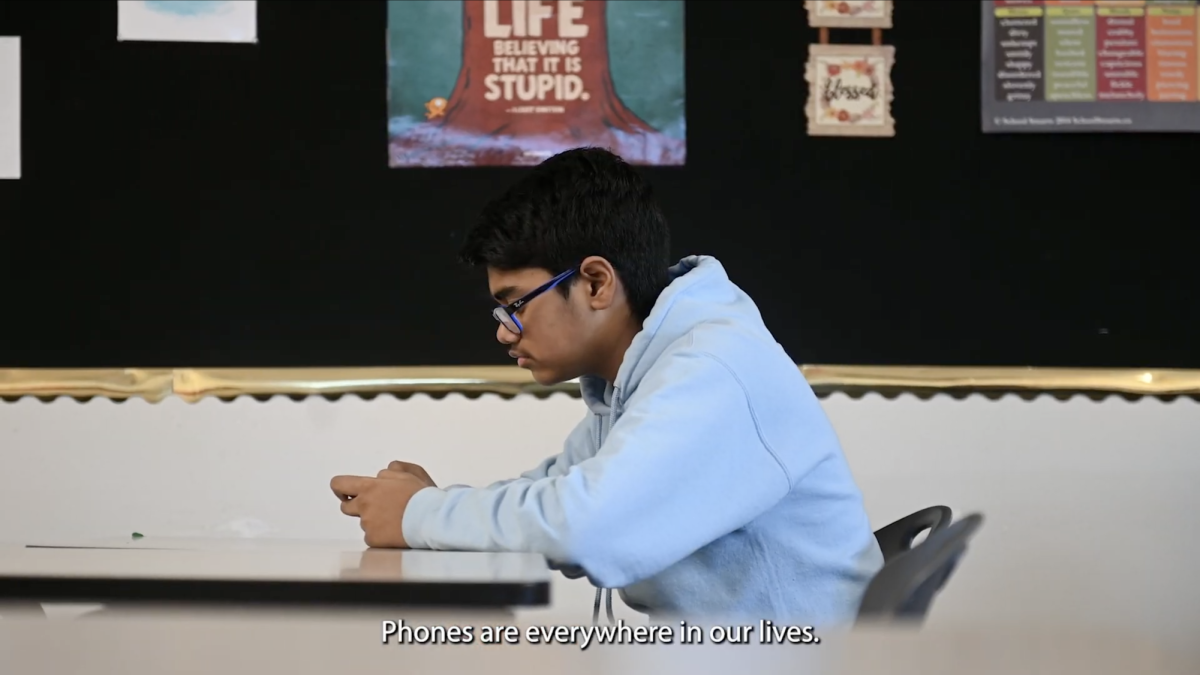
![Blue lights shining brightly, senior Riley Creely beatboxes into the microphone. Creely and the group began the performance in front of the blue lights, sparking interest from the audience. “The pep rally performance was fun. I got to beatbox for the first half of the song, which was hype. I liked to look into the student section [while I performed],” Creely said.](https://pwestpathfinder.com/wp-content/uploads/2025/09/DSC_5085-Enhanced-NR-1200x799.jpg)

![Leaping through the air, senior Tyler Watts celebrates his first goal of the season, which put the Longhorns up 1-0 against the Lafayette Lancers. Watts decided to play soccer for West for his last year of high school and secured a spot on the varsity roster. “[Playing soccer for West] is something I had always dreamed of, but hadn’t really had a good opportunity to do until now. It’s [really] fun being out [on the field], and I’m glad I decided to join the team. It’s just all about having fun with the boys and enjoying what time we have left together,” Watts said.](https://pwestpathfinder.com/wp-content/uploads/2025/09/DSC_1951-1200x855.jpg)
![Sophomore Natalie House pitches the ball during an intrasquad scrimmage for Red and Blue Night on Aug. 22. House played catcher for the varsity softball team. “I started [playing] softball when I was five. My brother played baseball, and I wanted to start sports like him. Scrimmaging against our own team is always kind of difficult because we all know each other's [weaknesses],” House said.](https://pwestpathfinder.com/wp-content/uploads/2025/09/DSC7191-1-1-1200x844.jpg)
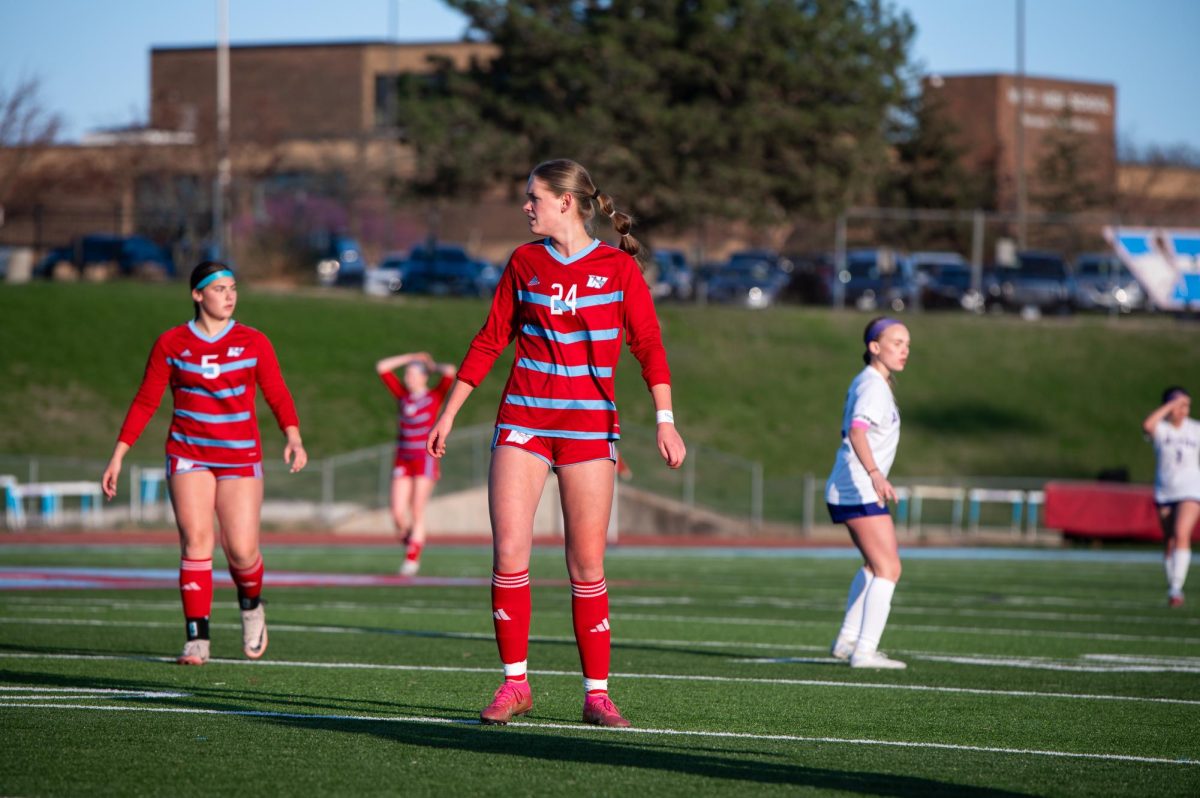
![Blending harmonies with dynamic control, senior Spencer Rahm takes the stage as part of the jazz choir's spring performance. Jazz Coffee House took place on April 22, marking the culmination of months of preparation by West High’s musicians. “To me, [choir] is an opportunity every day to get to sing with my friends and work on our songs that we have concerts for. [Seeing] the results after working together with people is really rewarding. Jazz Coffee House concert was a reflection and a result of all the hard work we've put in the last three months,” Rahm said.](https://pwestpathfinder.com/wp-content/uploads/2025/05/DSC_0214-3-1200x800.jpg)
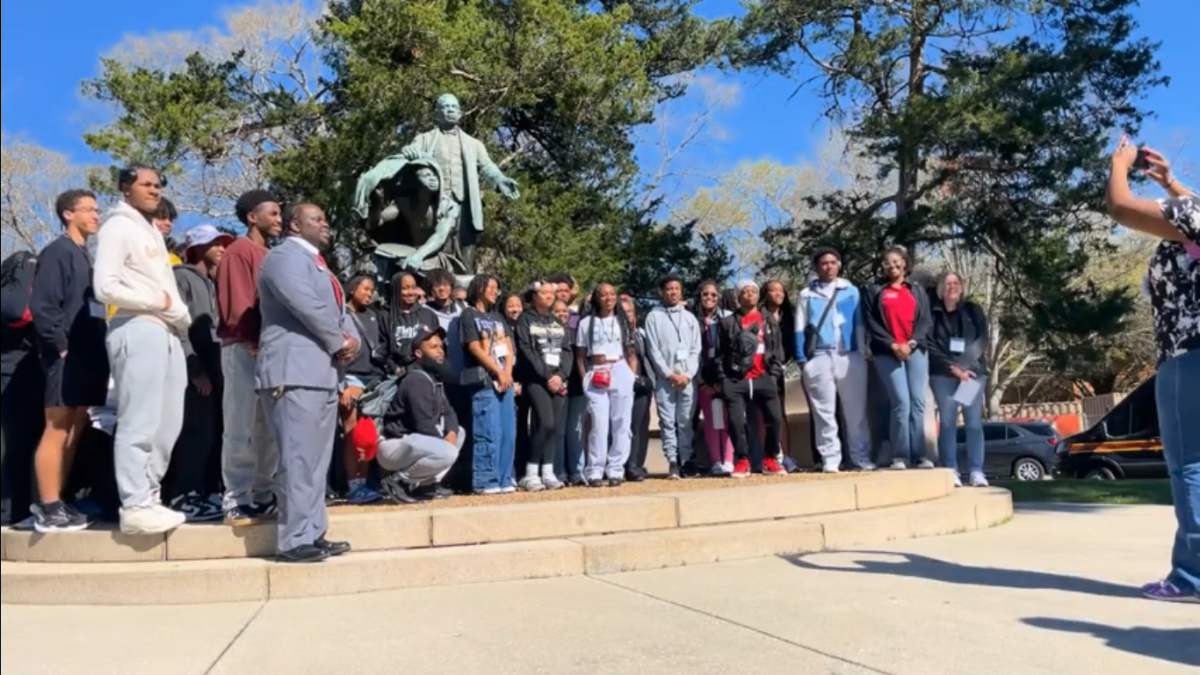

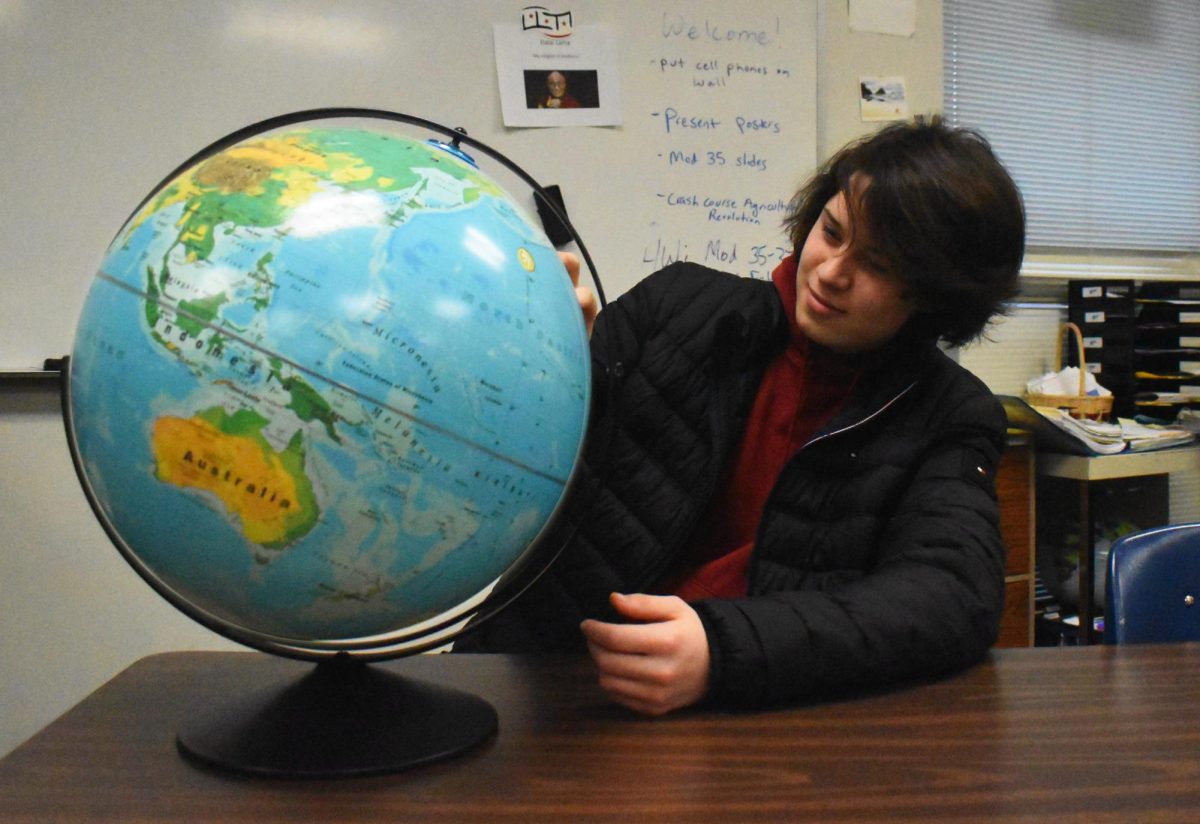





![In perfect shooting form and with eyes on the rim, junior Tyler Kuehl is about to shoot his next basket in the last game of the season against Marquette High School. Kuehl has been playing basketball since he was 5. “Even though I played basketball all my life, the game-winning shots can be pressure, it's confidence. If you're going into that shot and not thinking that you're gonna make it, it's obviously not going in. And if you believe, [it will]. That's the only way you can succeed,” Kuehl said.](https://pwestpathfinder.com/wp-content/uploads/2024/01/unnamed-32-1-1200x1200.png)

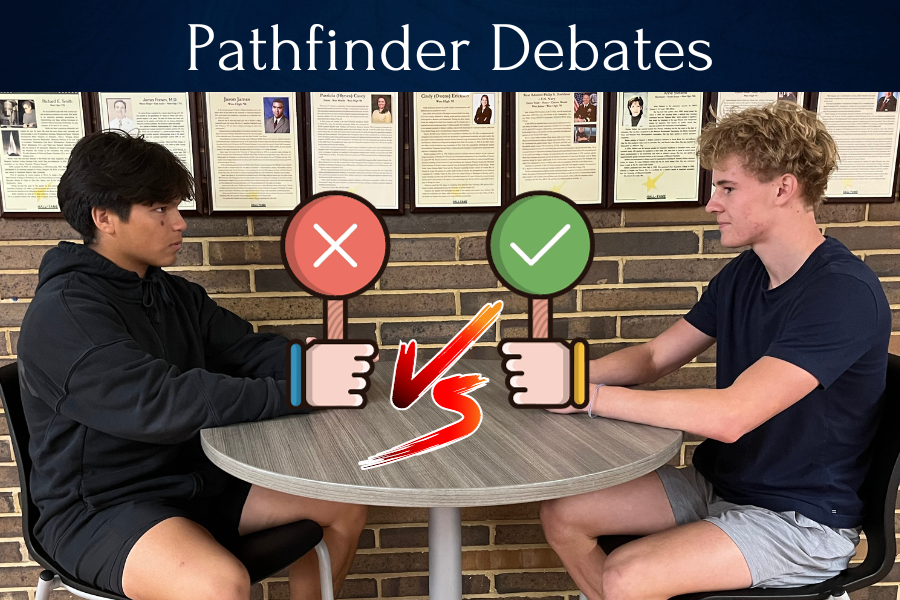
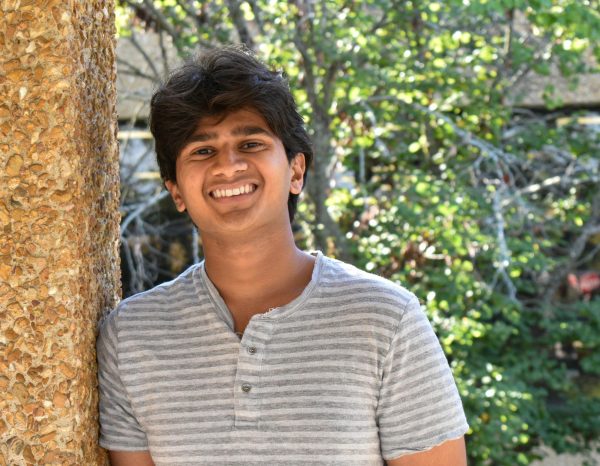
Cindy • Apr 10, 2023 at 8:17 pm
This is amazing. I always love listening to you both Samir and Gianna. I know you put a lot of effort into this, thank you for this wonderful episode! <3